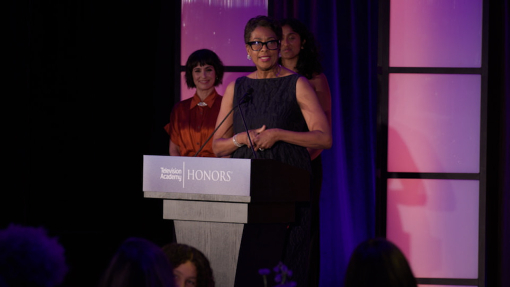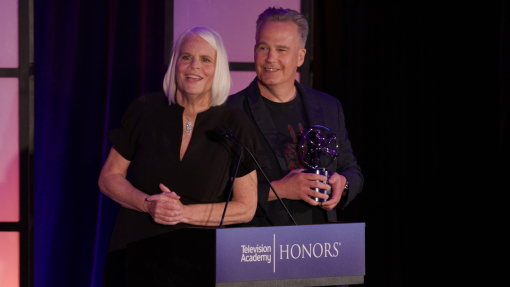Marinda Davis is a choreographer in her 30s who has been told she will probably not live beyond age 40.
She has eight autoimmune diseases, the result of being born heroin-addicted to an addict mother, and is considered to be terminally ill. The diseases have robbed her of her ability to dance, but have left intact her creativity and spirit.
"I want people to look at me and be able to put their own lives in perspective," she says. "What's in your way? Move it."
Davis is one of several people featured in The CW docuseries My Last Days, which recently launched its fourth season profiling those with terminal illnesses who have learned to keep living meaningfully even as they are dying.
The show was one of seven programs saluted at the 12th Television Academy Honors ceremony, which recognizes programming that not only entertains, but examines important life and societal issues, informing and inspiring viewers along the way.
Davis's directive to viewers to move past personal obstacles was one of numerous emotional moments screened before an appreciative audience at the ceremony, held May 30 at the Beverly Wilshire Hotel in Beverly Hills.
Niecy Nash, star of the TNT comedy series Claws, who also appears in the Netflix docuseries When They See Us, was the personable host; she acknowledged the absence of actress Dana Delany, who had hosted the previous ten ceremonies, but was unavailable this evening.
The people accepting their show's Honor were also emotional.
Said My Last Days executive producer-director Ahmed Musiol, at the podium with fellow executive producer-director Farhoud Meybodi, "The one thing that we've all got, that unifies all of us, is that this is ephemeral. We all have a definitive time here, and we get to choose what that looks like.
"And thankfully, tonight we have a rare opportunity to be amongst all of you, who have all chosen to spend your time doing something worthwhile – which is why we started doing My Last Days.
"Individuals like Marinda and Anthony [who has ALS] and everyone else who's been on our series have given us the gift of remembering that reality, that in fact we have a choice to be able to live a life that as [the late 21-year-old cystic fibrosis patient] Claire Wineland said, we can be proud of.
"I want to honor all of you … for spending your time creating something that we all get to benefit from. Thank you for doing that. Hopefully, this room becomes bigger and bigger every year, because we need what's in here."
A fictional depiction of someone living with a life-threatening illness – a sitcom, no less – was also among the honorees. The Netflix series Alexa & Katie, now streaming its second season, tells the story of two 14-year-old best friends: Alexa, who has a form of leukemia with a high cure rate, and the always-supportive Katie.
Alexa is determined to live normally and not be "the sick girl," even while undergoing chemo and its side effects.
As it turned out, cancer comedy became even more healing than creator-executive producer Heather Wordham had anticipated.
"Toward the end of shooting season two," she noted, "my sister found out that the cancer she thought she had gotten rid of three years earlier was actually still there, and had grown to a pretty large tumor. The news was terrible and frightening and I thought, 'Why would I ever think doing a show about cancer could be funny?' And then a few days later, my sister told me that she had named her tumor Fuck Face.
"And I told her, it's funny because I always call whoever I'm mad at at any given time, Fuck Face. And she said, 'I know. That's how I got the idea.' It reminded me why we have to find humor during these horrible, scary times. It's hard to breathe, and laughing helps us breathe again."
Matters of life and death took on a different form with the ABC drama A Million Little Things, which deals with a close-knit group of friends as they cope with the unexpected suicide of one of their own.
"I have to acknowledge the incredible writing staff," said creator-executive producer D.J. Nash in acceptance, "who reached into their own lives and told stories about losing loved ones to cancer and to suicide, and about being survivors of child sexual assault. Your willingness to be vulnerable has allowed us to tell these stories authentically."
Added Nash, who had lost a friend to suicide, "The whole series is not about one friend dying. It's about seven friends living."
The show has touched viewers deeply: one woman emailed him that she had stopped watching after she lost her son to suicide, and had returned for the season finale in hopes of gaining closure. Wanting to help her, Nash was able to connect her with a mother who had also lost her son and now ran a support group. The two mothers met, and texted him a photo.
"I told [cast member James] Roday, and he said, 'Well, if this is all our show does, if we're canceled right now, if we never make another moment of this, if all our show did was bring these two moms together, then it was worth it.' And I couldn't agree more."
Two shows that examine troubling police practices were also spotlighted. The HBO documentary I Am Evidence looks at the backlog of hundreds of thousands of rape kits lying unprocessed in police storage facilities throughout the country, denying rape victims justice and allowing their perpetrators to remain free to attack again.
The program was the inspiration of Mariska Hargitay, who stars as NYPD detective-turned-lieutenant Olivia Benson on NBC's Law & Order: Special Victims Unit and who learned of the backlog through her survivor advocacy work with her Joyful Heart Foundation.
And the six-part Paramount Network documentary series Trayvon Martin: Rest in Power chronicles the 2012 death and its aftermath of 17-year-old Trayvon Martin, a young black man in South Florida who was shot and killed by neighborhood watch participant George Zimmerman as he walked home from a store.
Accused of racial profiling as well as murder, Zimmerman pleaded self-defense and was acquitted. Throughout the process, police were less than accommodating in the pursuit of justice for Martin; the case polarized the country regarding race and other issues.
Said I Am Evidence director Trish Adlesic, accepting with director Geeta Gandbhir, "Testing rape kits sends a powerful message to survivors that what happens to them matters. As [survivor] Ericka Murria so beautifully states in the film, 'I am evidence that regardless of what happens to you, you can get through it. You can move past it. You can grow, you can change for the better.
'I am evidence that there is more to that box. There is a human being there. It is not just a kit. This is a person.'
"We want to thank the Television Academy and its members for this important recognition and helping us shed light on this issue. It's moments like this that get the attention of people who want to continue this conversation and help us fix this problem."
Martin's mother Sybrina Fulton, an executive producer of Rest in Power, received a standing ovation when she took the podium, accepting with executive producer-writer-director Julia Willoughby Nason.
"I'd just like to say, you never know what role God is going to lead you in," Fulton said. "You never know what your purpose in life is until you're put in that position. I would have never dreamed of being in this position, where I had to speak for my son who's in heaven, but I take the position with honor and with grace. This is for my son, Trayvon Martin."
Added Nason, "I'd like to thank the Television Academy, and I'm honored to accept this award with Sybrina Fulton and [Trayvon's father] Tracy Martin. They trusted us to hold their tragedy and honor their grief. They sacrificed their privacy despite tremendous pain. They extended their hearts to all families suffering from America's original sin.
"Thank you, Sybrina for trusting us, and we will fight for Trayvon for the rest of our lives."
A documentary about a woman noted for promoting racial equality, as well as women's rights, also received an Academy Honor: CNN's RBG, about Supreme Court Justice Ruth Bader Ginsburg. Now 86, Ginsburg is only the second woman to be named to the Supreme Court, nominated in 1993.
"RBG is the first documentary about a sitting Supreme Court Justice, one who occupies a pivotal role in our democracy and has an extraordinary backstory as the legal architect of the modern women's movement," said RBG producer-director Betsy West, who shared an acceptance speech with producer-director Julie Cohen.
"We began in 2015, before the #MeToo movement took off, before Time's Up and before our political landscape reached a fever pitch of incivility."
Continued Cohen, "When we finished three years later, the world had changed. We are thrilled that RBG has resonated with people of all generations and genders, and even some different political perspectives. She is truly inspiring."
A show that celebrates the right to be one's own unique self – onscreen and off – also joined the ranks of Honors recipients. The FX series Pose, set in the 1980s New York drag ball culture, presents the interwoven stories of members of the LGBTQ community as they vie in ball competitions, cope with the rising HIV/AIDS epidemic of the time and recreate their own versions of a family.
The show features the largest-ever cast of transgender actors in regular and recurring roles, and employs transgender writers, producers and directors.
"Where are the narratives of LGBTQ people of color? This is the question that prompted me to write the first draft of Pose in 2014," said creator-executive producer Steven Canals in accepting. "I yearned to see myself, my people, on television. I wrote a story about a young black boy kicked out of his home because he is gay, who was given refuge by a trans woman who becomes the mother that we all deserve.
"That pilot was met with much resistance. I was told the story was too niche, two urban, not commercial enough. But I knew in my gut that a show that centers black and Latinx LGBTQ people unapologetically, and informs viewers that our lives and our narratives have value, deserved to be told.
"Pose is a love letter to our forebears and to ourselves, putting us at the center to tell a story about resilience, love and family."
Janet Mock, who is transgender and is a producer-writer-director on the show, said she had no idea that her hiring was historic, "that I would break barriers in the industry just by simply being who I am. That I would be given the opportunity as a trans woman to direct other trans women playing trans women."
She was not hired to make history, though, but to tell the stories as someone who had lived them.
"Thank you to the Television Academy for this recognition, and for affirming our message of inclusivity," Canals said in conclusion. "We are humbled by this honor."
Howard Meltzer chairs the Television Academy Honors Selection Committee; Mitch Waldow is vice chair. Committee members are Beth Bohn, Paul Button, Debra Curtis, Leah Daniels-Butler, Patrika Darbo, Laura Guzik, Judalina Neira, Carla Renata, Glenn Rigberg, Michael Ruscio, ACE, Jill Sanford, John Simmons, Marla Tellez, Stephen Tropiano, Ann Leslie Uzdavinis and Kulap Vilaysack.
The Academy Honors was created by production designer John Shaffner, then co-chair of the Academy's social outreach committee who later became Academy chair and CEO, and developed with committee co-chair Lynn Roth and former Academy chair Dick Askin.











